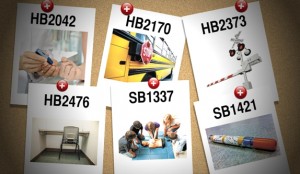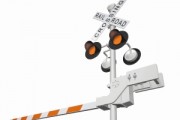Lifesaving Laws
Luige del Puerto//September 6, 2013//[read_meter]
 With little fanfare, lawmakers take small steps to make the state safer
With little fanfare, lawmakers take small steps to make the state safer
On Sept. 13, most of the laws that legislators and the governor enacted in this year’s session finally take effect. While several were highly controversial, such as expanding the state’s Medicaid program or simplifying the sales tax system, others are aimed at saving people’s lives. Many of the life-preserving measures deal with schools and most were approved quietly and without controversy.
 HB2042. Schools; diabetes management
HB2042. Schools; diabetes management
Sponsor: Rep. Heather Carter, R-Phoenix
Summary: The law authorizes volunteers to administer insulin or assist a student in self-administering insulin. Students’ parents are required to provide the medication and the equipment. Schools must provide any medication administration services that are specified in a pupil’s diabetes management plan.
Why it’s notable: It’s among several bills aimed at addressing potential medical emergencies at schools.
 HB 2170. Stopped school buses; lights
HB 2170. Stopped school buses; lights
Sponsor: Rep. Karen Fann, R-Prescott
Summary: The law expands the requirement for school bus operators to display and extend the stop sign when children are getting on or off the bus on a private road. Previously, the law only required them to do so on public roadways.
Why it’s notable: Prompted by the 2008 death of an 8-year-old, it reinforces the need for school bus operators and the public to be extra-mindful about the safety of schoolchildren.
 SB1421. School personnel; emergency epinephrine administration
SB1421. School personnel; emergency epinephrine administration
Sponsor: Sen. Linda Lopez, D-Tucson
Summary: The law gives a trained school staffer the authority to administer auto-injectable epinephrine to a student or adult who is experiencing a severe allergy attack. A school is also allowed to stock the anti-allergy medication. The bill provides civil immunity to the school staffer, except in cases of wanton or willful neglect. Additionally, the state Board of Education is required to adopt rules prescribing annual training for school staffers on the administration of auto-injectable epinephrine, on recognizing the symptoms of an anaphylactic shock and on the procedures for administering auto-injectable epinephrine during an emergency.
Why it’s notable: Allergic reaction to food is a growing concern for children. The bill allows a school to be more proactive in dealing with this life-threatening emergency.
 HB2373. Railroad crossing; safety
HB2373. Railroad crossing; safety
Sponsor: Rep. Karen Fann, R-Prescott
Summary: Arizona law already spells out the conditions when drivers may not cross railroad tracks. HB2373 adds new safety restrictions, such as a vehicle may not make a U-turn over tracks and pedestrians may not remain in the area between railroad signs or signals. The law also specifies when a motorist may proceed across tracks when lights are flashing if there is no train in sight, but there must be a clear line of sight of at least one mile in both directions.
Why it’s notable: The law brings further attention to the need for extra caution when crossing railroad tracks.
Sponsor: Sen. Barbara McGuire, D-Kearny
Summary: The law allows schools to provide students from grades 7 to 12 with CPR training. A student may be excused from the instruction at his or her parents’ request or if he or she has already received prior CPR training. This law, however, is not effective until July 1, 2015.
Why it’s notable: It’s another tool that students can use in a life-threatening situation.
 HB2476: Schools; isolation rooms; restrictions
HB2476: Schools; isolation rooms; restrictions
Sponsor: Rep. Kelly Townsend, R-Mesa
Summary: The law spells out when to use solitary confinement as a disciplinary measure at school. Under the new law, it’s only allowed if a prior written notification by parents has been secured – except when the student poses imminent physical harm to him or herself or others.
Why it’s notable: The law sheds light on the practice of locking up students in a tiny room as a disciplinary action. Considered a first step toward a solution, the measure provides guidance on what school districts are allowed to do to deal with students who need special attention.
Laws with a low profile
Here is a sampling of other new laws that flew under the radar during the 2013 legislative session:
SB1087, sponsored by Sen. Judy Burges, R-Sun City West, requires owners of a licensed taxi or limousine service to complete pre-employment and annual random drug testing on any driver operating the vehicle. Testing records must be available at all times for inspection by the Department of Weights and Measures. Though the law lacks teeth for enforcement, companies may choose to not hire those who fail drug tests, and the testing may scare off those who might operate a vehicle under the influence of drugs.
SB1209, sponsored by Sen. Adam Driggs, R-Phoenix, expands the prohibition on a minor buying or possessing a tobacco product and on a person selling or furnishing a tobacco product to include electronic cigarettes, defined as a noncombustible tobacco-derived product that employs a mechanical device to heat a liquid nicotine solution contained in cartridges. With the rise in popularity of electronic cigarettes, the law extends the same prohibition on minors buying or using the electronic cigarettes as on real cigarettes. It ensures that children cannot buy or use electronic cigarettes, which contain nicotine just like real cigarettes.
SB1139, sponsored by Sen. Gail Griffin, R-Hereford, establishes the fourth Saturday in July of each year as National Day of the Cowboy, to celebrate the contribution of the cowboy and cowgirl to America’s culture and heritage.
HB2212, sponsored by Rep. Kate Brophy McGee, R-Phoenix clarifies that Arizona counties may designate the Friday after Thanksgiving as a legal county holiday in lieu of Columbus Day.
HB2312, sponsored by Rep. Eddie Farnsworth, R-Gilbert, makes it a class 2 misdemeanor to use an automated system to send a text message for the purpose of soliciting persons to purchase goods or services.
SB1278, sponsored by Sen. Nancy Barto, R-Phoenix, prohibits homeowners associations from regulating any roadway owned or held by a government entity.
HB2159, sponsored by Rep. John Kavanagh, R-Fountain Hills, prohibits universities operating under the Arizona Board of Regents from using student tuition fees to collect funds for private organizations. The law ended a long-running arrangement that allowed the Arizona Students Association, a nonprofit group that lobbied on behalf of students and donated money to political campaigns, to collect money through the university tuition system.


















